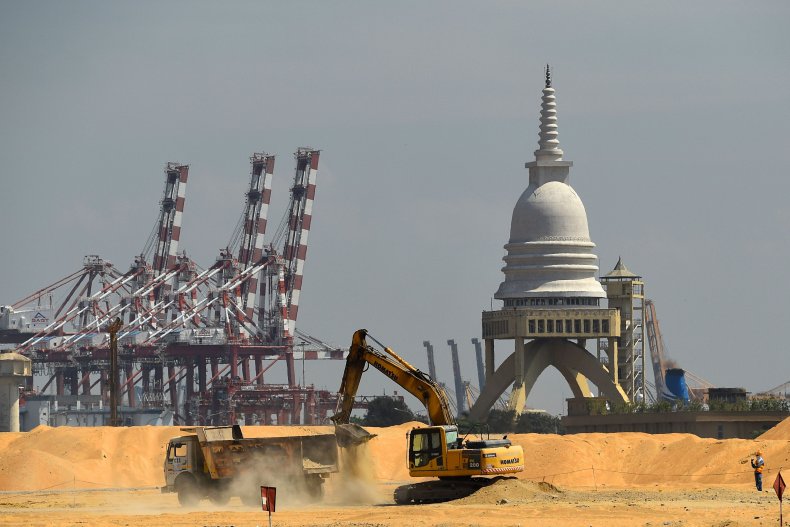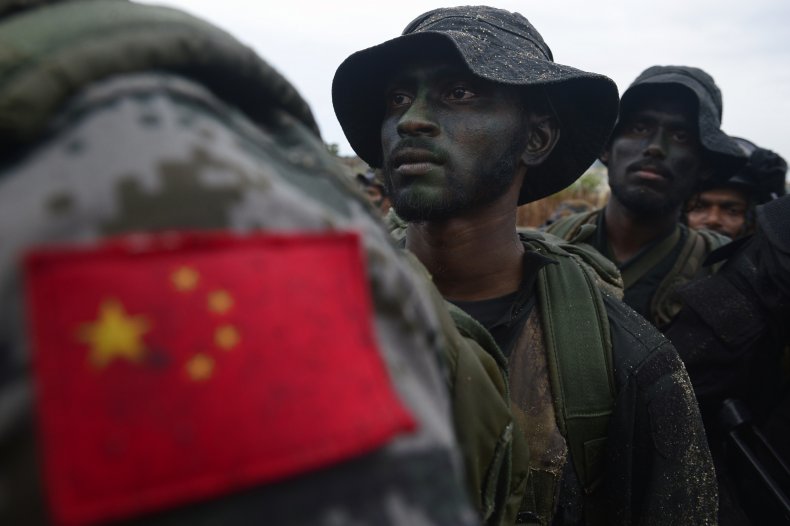![[Newsweek]ISIS church bombs help China gain Indian Ocean ally to America’s chagrin [Newsweek]ISIS church bombs help China gain Indian Ocean ally to America’s chagrin](https://d.newsweek.com/en/full/1626463/china-sri-lanka-military-exercises.jpg)
Outrage following a deadly Islamic State militant group (ISIS) bombing last year helped pave the way for a return to power for Sri Lanka’s influential Rajapaksa brothers, two men who have forged a close relationship with China in spite of the United States’ attempts to contain the People’s Republic in the region.
For a decade, President Mahinda Rajapaksa and Defense Minister Gotabaya Rajapaksa dominated Sri Lankan politics, gaining popularity with a decisive victory over the Tamil Tigers insurgent group. The brothers stepped down after elections in 2015 brought a change in government. But the 2019 Easter Sunday blasts that killed more than 260 rocked the South Asian island nation, which is located off the southern tip of India in the strategically important Indian Ocean.
Outrage over the perceived negligence on the part of the standing government fueled a nationalistic wave that propelled Gotabaya Rajapaksa to a victory in elections last November. He assumed office earlier this month.
Gotabaya Rajapaksa moved quickly to appoint his brother as premier, re-establishing the grip of his family on Sri Lanka. That consolidation of power appears to be leading to an acceleration and expansion of the country’s growing relationship with China, which has poured billions of dollars into infrastructure endeavors, from a performing arts theater to a strategic port in the strategically located island. Sri Lanka is a key part of Beijing’s worldwide Belt and Road Initiative (BRI), one of its “String of Pearls” linking Chinese projects across the Indian Ocean from Asia to Africa.
Get your unlimited Newsweek trial >
But Washington has cried foul, viewing these moves as those of a geopolitical competitor gaining influence throughout a crucial maritime corridor at the expense of host nations.
“We have consistently expressed our concerns about the People’s Republic of China’s (PRC) predatory lending practices in many countries, which threaten to cripple developing nations that are already suffering heavy debt loads and the pandemic’s impact on their economies,” a State Department spokesperson told Newsweek.
“Beijing issues loans through opaque, state-backed arrangements that undercut international standards of transparency and debt sustainability, often to fund projects of questionable economic value built by Chinese firms,” the spokesperson said. “In doing so, the PRC undermines the competitiveness of the local private sector and stifles sustainable development in the places that need it most.”
The spokesperson told Newsweek that the State Department has instead encouraged nations like Sri Lanka “to prioritize an alternative approach – a transparent, private sector-driven investment, grant, and business model – with a proven track record for delivering sustainable growth, reducing poverty, and fostering technological innovation.”
Get your unlimited Newsweek trial >

ISHARA S. KODIKARA/AFP/Getty Images
When confronted with criticism of the BRI during his first post-election India trip in February, Mahinda Rajapaksa told the Hindustan Times that Sri Lanka had benefited from the BRI.
“By the way, let me remind you,” Rajapaksa said, “our external debt towards China is only 12 percent of our overall external debt, and we have not defaulted. We used whatever money we took from them to build infrastructure.”
Reached for comment, China’s embassy in Washington referred Newsweek to Foreign Ministry spokesperson Zhao Lijian’s response at the time.
“China and Sri Lanka share a strategic cooperative partnership based on sincere mutual assistance and ever-lasting friendship,” Zhao told a press conference in remarks sent to Newsweek. “Based on Sri Lanka’s development needs, China offered loans to support its infrastructure building and other major domestic projects concerning people’s livelihood.”
Zhao argued that Beijing was attentive to the debt sustainability of recipient countries as well as the will of their governments. He said Chinese funding has helped governments in overcoming hurdles in building new infrastructure and to foster independent development.
Colombo’s embassy in Washington declined Newsweek‘s request for comment. As for the people of Sri Lanka, both significant benefits and substantial concerns have emerged.
“Sri Lanka is seen as one of the vital nodes along China’s Belt and Road Initiative,” Yasiru Ranaraja, a PhD student at Sri Lanka’s University of Kelaniya co-director of the non-governmental Belt & Road Initiative Sri Lanka organization, told Newsweek. “Due to that fact China is keen on investing in Sri Lanka. Chinese technology, talents, rich experience, know-how will have a great chance to benefit if Sri Lanka works together for a shared vision.
“However, some of the BRI projects in Sri Lanka are criticized for a lack of transparency and economic sustainability,” he added, highlighting the case of insufficient revenue generated by the Hambantota port that continues to be the source of controversy in the country.
While Ranaraja noted that the motive for Chinese investment was “largely to enhance connectivity to boost global economic links,” he admitted that “it may serve to strengthen China’s economic and security interests as well.” He pointed specifically to Gotabaya Rajapaksa’s appointment of former navy commander Admiral Jayanath Colombage as a senior diplomat as indicating how “the Rajapaksa regime is focusing on the growing Indian Ocean geopolitical grab.”

LAKRUWAN WANNIARACHCHI/AFP/Getty Images
The U.S. objections to the BRI connection with Sri Lanka are part of its strategic effort to push back against China’s growing regional influence in South Asia, which it is acquiring through its economic empire and the potential for projection of the military power it has already established further east in the South China Sea. The U.S. approach, called a “free and open Indo-Pacific,” most centrally includes Australia and Japan. India fills out the triumvirate while playing an increasingly crucial part in the coalition. It’s leadership has a checkered past with Sri Lanka under the Rajapaksas, and it presently engaged in a deadly border dispute with China that has highlighted the clashing spheres of influence in Asia.
While Ranaraja predicted Sri Lanka would continue to engage with all major powers of the region, including the U.S. and India, he also foresaw that “China’s engagement with Sri Lanka will increase as [the Rajapaksa government] is considered a regime favorable to China.”
Newsweek recently reported on how the growing U.S.-India alliance strained relations with Pakistan, another close partner of China in South Asia. Now Washington and its regional partners must contend with the prospect of closer ties between Beijing and Colombo, the Sri Lankan capital.
“Our policy is to champion a free and open Indo-Pacific in which all the region’s diverse nations and their people can live and prosper in peace,” the State Department spokesperson told Newsweek. “Our policy defends a free and open Indo-Pacific in which countries are secure in their sovereignty and equal in their shared use of the global commons.No hegemonic power dominates others in a free and open Indo-Pacific.”
![[Indian Express]INDIA allies as Kashmir rivals – religious leader and Omar party man files nomination to take on Mehbooba [Indian Express]INDIA allies as Kashmir rivals – religious leader and Omar party man files nomination to take on Mehbooba](https://data.indianexpress.com/election2019/track_1x1.jpg)
![[Times of India]Pakistan imposes Section 144 in Punjab ahead of by-elections | World News – Times of India [Times of India]Pakistan imposes Section 144 in Punjab ahead of by-elections | World News – Times of India](https://static.toiimg.com/photo/msid-109412896,imgsize-140982.cms)

![[Daily Excelsior]Div Com Kashmir chairing meeting on Thursday. [Daily Excelsior]Div Com Kashmir chairing meeting on Thursday.](https://cdndailyexcelsior.b-cdn.net/wp-content/uploads/2024/04/page9-6-5-696x307.jpg)
![[Voice of America]Afghans with disability urge Taliban to end ban on aid agency [Voice of America]Afghans with disability urge Taliban to end ban on aid agency](https://gdb.voanews.com/01000000-0a00-0242-95a2-08dc5fdb32bc_cx0_cy5_cw0_w800_h450.jpg)
![[Daily Excelsior]Microblogging site X says ‘continue to work' with Pakistan Govt to understand its ‘concerns' [Daily Excelsior]Microblogging site X says ‘continue to work' with Pakistan Govt to understand its ‘concerns'](https://cdndailyexcelsior.b-cdn.net/wp-content/uploads/2024/04/x-ray-696x408.jpg)
![[Rising Kashmir]World Heritage Day [Rising Kashmir]World Heritage Day](https://img.risingkashmir.com/wp-content/uploads/2024/04/02000321/editorial.jpg)
![[The Northlines]Sri Sathya Sai Sanjeevani Hospitals celebrates completion of 30,000 paediatric heart surgeries [The Northlines]Sri Sathya Sai Sanjeevani Hospitals celebrates completion of 30,000 paediatric heart surgeries](https://thenorthlines.com/wp-content/uploads/2024/04/cr-20240417pn661fc5df4d388.webp)
![[The Hindu]Lok Sabha Elections 2024, phase 1 voting LIVE Updates | 16 crore voters on the rolls across 17 States, 4 UTs [The Hindu]Lok Sabha Elections 2024, phase 1 voting LIVE Updates | 16 crore voters on the rolls across 17 States, 4 UTs](https://www.thehindu.com/theme/images/th-online/1x1_spacer.png)
![[Free Press Journal]India Secures Release Of Sole Woman Sailor From Seized Israeli-Linked Cargo Ship In Iran [Free Press Journal]India Secures Release Of Sole Woman Sailor From Seized Israeli-Linked Cargo Ship In Iran](https://media.assettype.com/freepressjournal/2024-04/08dc5439-871d-4c3f-a58e-a3e3b303037f/toq6mv78_ann_tessa_joseph_625x300_18_April_24.webp)
![[The Northlines]Why 4,500 Indian IT Leaders Moved On [The Northlines]Why 4,500 Indian IT Leaders Moved On](https://thenorthlines.com/wp-content/uploads/2024/04/18thierry-delaporte.jpg)
![[Anadolu]Asian countries back 2-state solution for lasting peace in Middle East [Anadolu]Asian countries back 2-state solution for lasting peace in Middle East](https://cdnuploads.aa.com.tr/uploads/Contents/2024/04/18/thumbs_b_c_a8734e65c3866299ccb5dff17cd87a88.jpg?v=203849)
![[Hindustan Times]Dubai flood: Indian consulate issues helpline, guidelines for people stranded [Hindustan Times]Dubai flood: Indian consulate issues helpline, guidelines for people stranded](https://www.hindustantimes.com/ht-img/img/2024/04/18/550x309/EMIRATES-WEATHER--42_1713461159705_1713461190811.JPG)

![[Newsweek]RFK Jr. accuses DNC and others of using fake protesters and online “trolls” [Newsweek]RFK Jr. accuses DNC and others of using fake protesters and online “trolls”](https://d.newsweek.com/en/full/2371127/rfk-jr-protesters.gif?w=1200&f=9cd64d48af3ad5a694c4878b44b3bc63)
![[Newsweek]Putin’s intel problem [Newsweek]Putin’s intel problem](https://d.newsweek.com/en/full/2368948/putins-intel-problem.png?w=1200&f=e78dc366f1411156e3e7245a650c68c3)
![[Newsweek]What Biden’s military options against Iran look like [Newsweek]What Biden’s military options against Iran look like](https://d.newsweek.com/en/full/2342193/irans-security-forces.jpg?w=1200&f=a89328767b03ea29bf996048f220f03c)
![[Newsweek]Iran-Pakistan update as Tehran offers olive branch after attacks [Newsweek]Iran-Pakistan update as Tehran offers olive branch after attacks](https://d.newsweek.com/en/full/2338021/iran-pakistan-strikes.jpg?w=1200&f=de69ed03e46f6b92b54997c91ee3f307)
![[Newsweek]Pakistan recalls Iran ambassador after missile strikes [Newsweek]Pakistan recalls Iran ambassador after missile strikes](https://d.newsweek.com/en/full/2336921/iranian-pakistani-foreign-ministers.jpg?w=1200&f=2479af9e05bc4eeabbfb8b99e9de7f7c)
